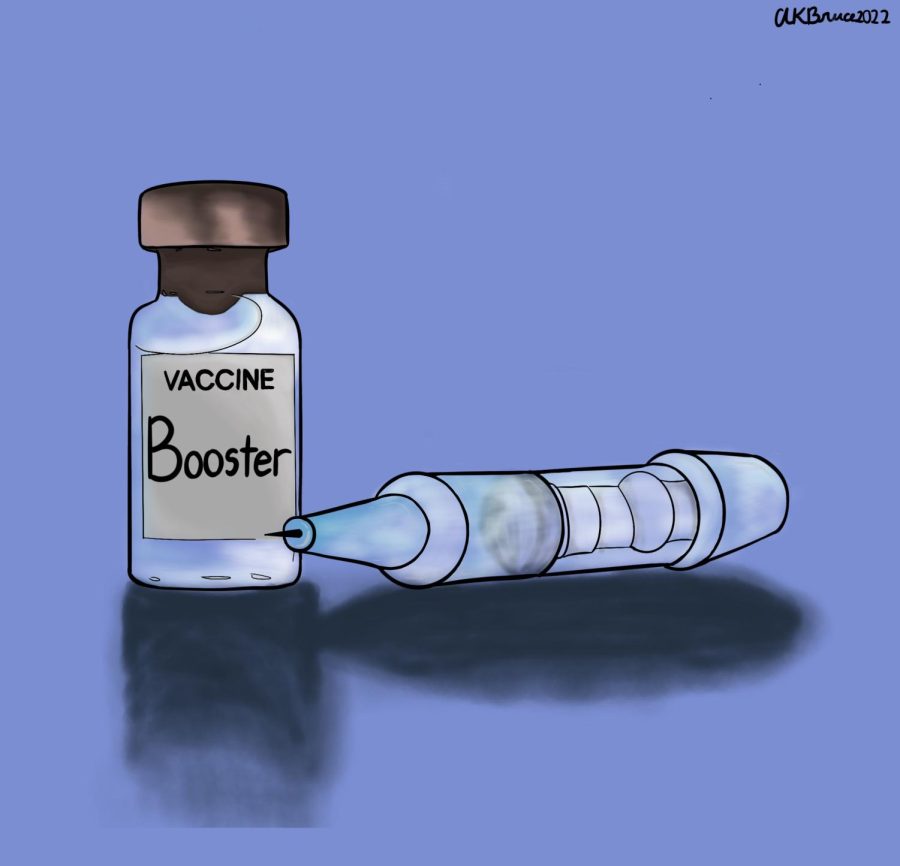Booster required at Linfield, as it should be
March 8, 2022
When students returned to campus at the beginning of spring term, everyone was required to return with their COVID-19 booster shot. Linfield University announced the requirement on Jan. 13, stating that all students must have the booster shot to be considered fully vaccinated.
Patricia Haddeland, the director of the Linfield Student Health, Wellness and Counseling Center, stated many reasons on why Linfield is requiring the booster.
“Linfield required boosters as a way to protect both campus communities as well as the communities in which we reside and work.” Haddeland said. “Linfield’s administration and the COVID-19 team recognize there are members of this community who are especially vulnerable to the COVID virus and in an effort to protect those people and reduce the stress on services on campus, as well as on the larger health care system, the decision to require boosters was made.”
Linfield should require the COVID-19 booster. Overall, it has helped bring case numbers down, nationally and at the Linfield level. The booster genuinely does give extra protection against the virus.
Prior to the Feb. 7 deadline, students who didn’t upload their booster documentation received a shocking email threatening unenrollment if their booster documentation wasn’t updated soon.
“You have not yet uploaded proof of your COVID booster or your exemption form. Failure to meet this requirement will result in a student code of conduct violation. Sanctions could include a hold on your student account or cancellation of enrollment,” the email from the university stated.
Many have differing opinions on requiring the booster, but most people are for it. To gauge student opinion, we posted a poll on The Linfield Review’s Instagram page asking the question, “Do you agree that Linfield should require the COVID-19 booster?”
In response to the poll, which was posted on Feb. 20, 106 people voted that Linfield should require the booster. 45 people voted otherwise.
Though this is a small sample to pull from and isn’t wholly reliable as representation as Linfield’s whole student body, I think this is a good representation of how the majority of Linfield students feel about requiring the booster.
One can look to statistics to see that the booster does help with reducing cases. On Jan. 25, the US Department of Health and Human Services/Centers for Disease Control and Prevention released the Morbidity and Mortality Weekly Report.
In the report, statistics are shared of case numbers between Oct. 4, 2021 and Dec. 25, 2021.
Overall, the age standardized stats for the amount of cases in the month of Dec. 2021 is a wide array. There were a reported 1,061,684 cases of unvaccinated people, a reported 800,940 cases of vaccinated people without the booster, and a reported 125,059 cases of vaccinated people with the booster.
Given the data, the CDC concluded that a booster dose offered protection, even with emerging variants.
So, there’s still COVID cases among people vaccinated with a booster. So is it still worth it? Yes.
In an article published by the New York Times, they cited recent studies that show that the booster may be the only COVID immunization shot one will need for a long time.
“The Omicron variant can dodge antibodies produced after two doses of a Covid vaccine. But a third shot of the mRNA vaccines made by Pfizer-BioNTech or by Moderna prompts the body to make a much wider variety of antibodies, which would be difficult for any variant of the virus to evade,” the article said, pulling from a study done by BioRxiv.
So, the booster provides less of a chance of getting the virus, and should also prevent the body from getting variants in the future. These are great reasons that help explain why Linfield is requiring the booster, and propel my argument that the booster requirement is a good thing.
It is not fair to those who are especially vulnerable and could get deathly sick from COVID to not get boosted. It is our responsibility within the Linfield community to think of the wellbeing of other members of the community.
Overall, since the booster has been required, case counts have been low. In January, with the emergence of Omicron, cases increased quickly, and students on campus for Jan Term began to worry as cases consistently climbed.
By the end of Jan Term, on Jan. 31, the biweekly campus newsletter, Linfield Ahead, reported 117 total cases reported since Jan. 1.
In the entire month of February, only 19 cases were reported on the McMinnville campus.
The huge decrease of cases to me is a surefire sign that requiring the booster is working. Cases are staying low, unlike how they skyrocketed in January, and the booster undoubtedly is a big player in why.
I can confidently say that I believe Linfield has made the right choice in requiring the booster for students, staff and faculty. Let’s stay safe, hope for a pandemic free 2023 school year, and keep wearing those masks.

